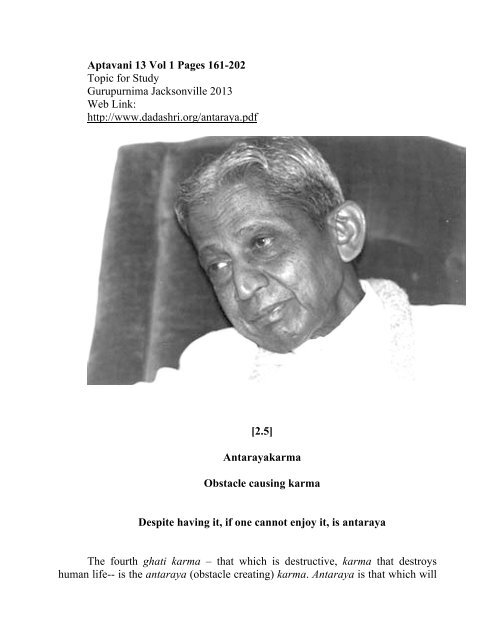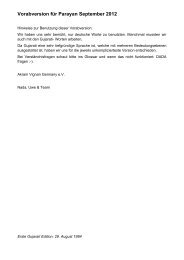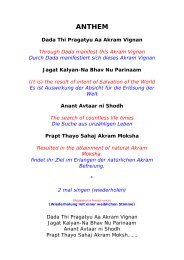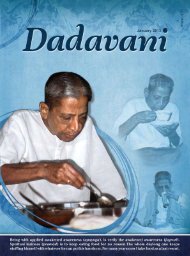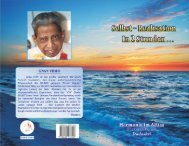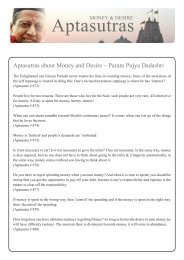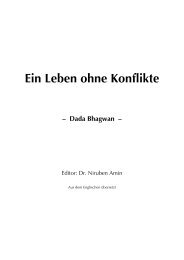You also want an ePaper? Increase the reach of your titles
YUMPU automatically turns print PDFs into web optimized ePapers that Google loves.
Aptavani 13 Vol 1 Pages 161-202Topic for StudyGurupurnima Jacksonville 2013Web Link:http://www.dadashri.org/antaraya.pdf[2.5]Antaraya<strong>karma</strong>Obstacle causing <strong>karma</strong>Despite having it, if one cannot enjoy it, is antarayaThe fourth ghati <strong>karma</strong> – that which is destructive, <strong>karma</strong> that destroyshuman life-- is the antaraya (obstacle creating) <strong>karma</strong>. Antaraya is that which will
to eat, so why not let her! Perhaps she did not like bhakari (wheat bread). Thehusband would nag her every day. One day the lady told me, ‘Everyday when I eat,he does not let me eat in peace!’ Allya mooah! (Hey you, dying man!), what kindof a man are you? This is called antaraya <strong>karma</strong>. You will not get any rice to eat.Why are you doing this? Why not sit peacefully? He did not have theunderstanding and thinks that the problem will be solved by doing that. Let’ssuppose that eats less the next day, but obstacles will be created against you, won’tthey?Questioner: But we do not know all this, and that is why we create manysuch obstacles. Today is the first time that we have come to know of this.Dadashri: It is not that you don’t know of it, no one else knows it either. Allthese words that have been written in the scriptures, only the Gnani Purushunderstands them. Others just talk about them. They will say, ‘I have antaraya<strong>karma</strong>, I have antaraya <strong>karma</strong>’, but hey, what is antaraya? What is it? You haveno knowledge, you just talk big, that is all! There are big words in the scriptures,but if you ask them, ‘what does this mean? Please explain it to me in a way that achild would understand.’ They will say no, they don’t know that. They can only dothat when they understand it themselves. Whereas, I will tell even a child, hey,why are you creating obstacles even when this much is being given? You will notget things! That is antaraya <strong>karma</strong>! That is called vigna (obstacle; impediment)<strong>karma</strong>. We create the vigna, so the vigna comes to us. That is called vigna <strong>karma</strong>.Questioner: So in such circumstances, for example if she has diabetes andshe takes a lot of rice, should we become the ‘knower-seer’ and keep ‘seeing’ that?Dadashri: What else are you going to do? And what will happen even ifyou do not? Whatever she may be doing, even if she pours a whole container ofghee (clarified butter) over it and eats, what has that got to do with you? You aretroubled because she is eating in your presence, isn’t that so? Even when you arepresent, think of yourself as being absent. Think to yourself, ‘I am not there’. Shewould do the same, if you were not present, wouldn’t she? The poison is yourpresence, so get rid of the poison. All the poison is from what you see.Questioner: With the clarification we got today, we will find the solutionsfor many things. All we are doing is only antaraya <strong>karma</strong>.If we see that something is going to harm someone, then shouldn’t we say‘no’ to him?
legs, but you should drive them off your form. Do not strike on the belly or thehead. If you need the crop, drive them off the farm, otherwise let them respectfullystay, but you will not bind antaraya <strong>karma</strong>. Antaraya <strong>karma</strong> is a different thing, soyou do not have to fear.What does antaraya mean? If someone is giving a donation, and I tell him‘At least make sure that the person you are giving to is deserving of it. If you givewithout checking, you will come into bondage.’ Now that poor man is about toreceive something, he is unhappy and in misery, he is getting something, and thisman is giving to that person, and I am using my intellect in that.Questioner: He is creating antaraya.Dadashri: No, if he was creating antaraya, the wretched man would becomecautious! But he uses his intellect thinking, ‘I am making him understand. I amclever and intelligent and this man does not have any sense.’ So if he, himself wasabout to gain some benefit (labh), an obstacle will arise against it. Then he says, nomatter what kind of business he does, it is not successful and they are notprofitable. Hey, you have come having created antaraya <strong>karma</strong>, how are you goingto gain from it?One has created obstacle <strong>karma</strong> wherever he has gone. Wouldn’t peoplehave created such obstacles? Wherever he went; this sack of intellect! He interfereswhen someone is giving. Hey, why do you have to worry about that? You shouldnot be interfering in what he is giving. But this intelligent person will give adviceto the other person, ‘You have no sense, how can you give like this?’ And so thatcreates obstacles. For this reason, people have obstacles. It is because he is theSelf even though he behaves, according to his prakruti (prakrutimai). Let theprakruti be. But the one who has not created obstacles (antaraya), he getswhatever he wishes for.And this is an entrusted thing, when one has entrusted a thousand times, itwill come back to him whenever he has the desire. So even that which you hadgiven; will come back to you. Whenever you have the wish that ‘I want to stopdoing business’, then all the money (owed to you) will come back to you, providedyou did not create any obstacles.And if one has created obstacles, then he will have to keep going back andforth for up to twelve months to collect a. He’ll go there and ask if the boss(debtor) is in, and the staff will tell him that he just left. He asks when he will be
ack, they tell him to return at half past three because the boss leaves at four. So hegoes home, but all day long his dhyan (mind is preoccupied) is on the debt, evenwhen the poor man eats. Whatever sadhana (efforts necessary to achieve oraccomplish something) one does, it will continue, won’t it? It will remain in hisdhyan (focus). This dhyan will not remain for women. They will go through themotion to collect a debt but when they come home, it’s over. But all these (men)are very clever, aren’t they? [They are] Emotional. The women are in ‘motion’(spontaneous, not excessive intellect). This man then leaves early to get there bythree-thirty – ‘it’s almost three-thirty. I’ll reach there in ten minutes!’ So he isengrossed in that awareness. Here the secretary tells the debtor that the sheth(creditor) had come to collect his money, and so he (debtor) says, ‘that’s fine if hecame. No problem. But you told him to come back and today I am in a hurry sosee if you can tell him to come tomorrow.’ But here the sheth had left by threefifteen.And then you should see how frustrated and angry he becomes, ‘why did Ilend him money? Why did I have to lend him money?’ And if he asks us, ‘Is it hisfault?’ So we would tell him, ‘No, sir. It is the fault of the obstacles that you havecreated. You created obstacles for other people and so this fault is due to that, he isnot at fault. When your obstacles come to an end, then everything will work outsmoothly!’So, because there is Atma within us, it is possible that whatever we desire toeat or drink, will come before us. But instead, it does not happen even when wemake the effort. On top of he’ll fight with you one day. ‘Why do you keep doingback and forth every day, is your money going to go away?’, so he gets upset. Andthen the creditor says, ‘Above all this, see how he speaks! I am the one that lenthim the money and just look at the way he talks!’ [But] The fault is your very own,he is not at fault. Whatever he is telling you, it is your own echo. You created thisproject; this is that very project. Have you had such an experience?One is the owner of the universe but…All these are obstacles. Otherwise you are the owner of the whole universe.Then one asks, ‘Why do we not experience (feel) that?’ When all obstacles leavethen You are the owner indeed. Who created the obstacles? Lord Mahavir? Theanswer is, ‘No, you have created them yourself.’ “You are whole and soleresponsible for your life.” One has created the obstacles himself. If ‘we’ do nottread carefully, then how are we going to survive? Here, the obstacle says, let’ssettle the account with minute details. This person will not be happy with anythingrudimentary. Yes mooah! There is infinite energy, why do you need to even thinkabout such interference? Simply ‘see’ it quietly the way it is going on. He will ask,
‘What will I do? How will I go to the lodge if I don’t have enough money for therent?’ Hey you! You cannot talk like that. Everything is ready ahead. To speak thisway, is the obstacle itself. And won’t it then bring him the fruit (effect)? Onecreates obstacle on his own. One has created obstacles for everything himself. Onecreates an obstacle at every word. If one speaks negatively, then an obstacle iscreated; obstacles are not created for positive speech.The Gnani has obstacle-free state‘We’ do not speak even a word. ‘We’ do not have any obstacles. We are inthe obstacle-free state (nir-antarai padh). Everything comes readily wherever ‘we’are sitting. ‘We’ do not think (wish) about anything, but even then it presentsbefore ‘us’. Why does this not happen for you? It’s because you have createdobstacles. ‘I don’t know this. This cannot happen for me.’ So then, what will thething say? ‘You fool! If you don’t know, then remain where you are. Why are youinsulting me?’ All these things that you see are mishra chetan (mixture of the Selfand the non-Self). This wood too, is made up of mishra chetan. It falls under thecategory of pudgal (non-Self complex of growth and destruction). This is notparmanu (matter; element; subtlest subatomic particle). This is pudgal. If you evercreate abhorrence for it, its result will come to you. If you say, ‘I don’t like thisfurniture,’ then the furniture will say, ‘you and I have an obstacle.’ That furniturewill not come to you. People have created obstacles for themselves for sure.One has created obstacles for everything himself. One creates an obstaclewith every word. If one speaks anything negative, then an obstacle is createdwhereas positive speech will not create obstacle.Obstacles in taking medicine or in thinking about it?Questioner: Now say we come down with some illness and we takemedicines to treat that disease. Also we have to endure the unfolding <strong>karma</strong>(udaya<strong>karma</strong>) that has come to us, so are we creating obstacles in treating theillness with medicine?Dadashri: No, no. Thinking about the medicine is antaraya, taking themedicine is not antaraya.Questioner: So is it because the illness is going to be cured, that one comesacross the medicine for it?
Dadashri: No, it may not even heal, it may even get worse. Yes, but onedrinks the medicine because the very same parmanus (sub-atomic particles) arethere within and to think about, ‘should I take the medicine. Should I do this orthat’, is obstacles. To think allopathic doctors are not good, naturopaths are better,so and so is better – all that is obstacles.Questioner: So in situations like that, should one not do any purushartha(effort) at all, and just keep ‘seeing’?Dadashri: What is purushartha? To keep ‘seeing’ is itself purushartha.Remaining the ‘knower-seer’ is purushartha.Questioner: But, should one not go to a doctor or do anything like that tohave the problem looked at?Dadashri: Just ‘see’ what happens. It is not considered antaraya if you goto a doctor to get checked out. If ‘Chandubhai’ (file number one) is going, ask him,‘What do you think? Do you want to go?’ If he says ‘yes’, then You say, ‘then go’.Do not create obstacles. What control do You have that it will be fine if you don’tgo to the doctor? How can you say something like that? The one going to thedoctor is separate, You are separate – or is everything as is?Questioner: So then Dada, if we remain in the purushartha of Knowing-Seeing, if we keep ‘seeing’ that whatever happens is correct, then the prakruti (therelative self) will have the full scope and whatever it has to do, it will happen.Dadashri: Do not create obstacles for the prakruti. The moment you say ‘dothis’ or ‘do not do this’; you create obstacles there. That is called having doneegoism. Why don’t you just ‘see’ what the prakruti is doing? Lord Mahavir kept‘seeing’ only His prakruti. If Ambalal (A. M. Patel; Dadashri’s relative-self) issitting with a shawl, ‘I’ can see him sitting, and ‘I’ can also see him talking. ‘I’ canalso see how his hands are moving. ‘I’ can see all his gestures of jest.Signification of Dada’s partial deafnessThere was a doctor who wanted to fit me with a hearing aid. He said to me,‘Dada, have it fixed.’ I told him, ‘No, no dear man. I don’t want to.’ So then hereplied, ‘Dada, it will give me the opportunity to do your seva (service)’. He was agood man; his intent was to give service (seva). The doctor would benefit for
treating the Gnani Purush, he would derive full benefit, because Dada’s intent iscomplete. So I told him, ‘But you are not seeing the harm to me’. He asked, ‘Whatharm?’ I told them, ‘This is the fruit of ‘our’ <strong>karma</strong>. ‘We’ have to discharge it. Sothis time, we want to discharge if completely. ‘We’ would not look for any othersolution. For ‘us’ there is no such thing as looking for a cure or solutions’.So if ‘we’ allowed him to fit the hearing aids, then how would ‘we’ dissipate‘our’ antaraya <strong>karma</strong>? That would be considered as pushing aside antaraya<strong>karma</strong>. So he asked, ‘what kind of antaraya <strong>karma</strong> would Dada have created?’ andthe answer is that, ‘if this man says something or if this man says something, he(dada in his past life) would scoff at them. So he did not listen even to the truth;that is why deafness comes. Even if someone would tell me the truth, I would notlisten, so tell me how much intellect there is! One would not listen even to thefacts. So what else will come if not deafness? So I explained this to the doctor andhe agreed. I told him that I have to endure it now. If someone is telling the truth,one will not listen, does he have to remain in his own ‘smartness’? That enough,enough, I understand, I understand, I understand’, he will not even let the poor manfinish what he is saying. Does that not happen? Has that ever happened to you?Questioner: It does happen.Dadashri: So one had not even listened to other’s truth. That is the cause ofthe obstacles (antaraya). So God says at least listen to the truth, why do you do somuch egoism?So that is where one’s deafness comes from. Any vishaya (subject) that hasnot been used with humility causes offence against that vishaya, without fail. Yes,if the eyes have not been put to good use, then one will have to wear glasses.Questioner: Sometimes it seems that the real obstacles (antaraya) are moreof the body. All these obstacles seem to be mostly of the body.Dadashri: Yes, they are more. Of course they are of the body, what else?There are not many of the mind.Obstacles to enjoyment and repeated enjoymentQuestioner: Can you please explain bhog antaraya and upbhog antaraya.
Dadashri: There are obstacles (antarayas) of bhog (enjoyment) and thereare obstacles of upbhog (repeated enjoyment). What does Lord Tirthankar considerbhog? And what does he consider upbhog? Once enjoyed, it is not enjoyed again.If you finish eating this mango, the one-time enjoyment is called bhog. Once it isgone from the stomach, it cannot be eaten again. Will it come into your memoryagain?Questioner: No it will not.Dadashri: Is that so? That is bhog, and what is oopbhog? You can wear thisshirt again, you can wear these glasses again, this body will be of use next day; sothat is oopbhog. If you can get repeated enjoyment, that is called oopbhog.And these clothes, people wear them every day, so that is called oopbhog.Men, women are all considered oopbhog. That which is enjoyed repeatedly isoopbhog.Questioner: You are saying the right thing, as if a tirthankar is speaking.You have made a minute demarcation.Obstacle against benefitQuestioner: Now, what is laabhantaraya (obstacle towards benefit)?Dadashri: All the obstacles are created through gnanantaraya.Laabhantaraya means that if you obstruct anyone from benefitting fromsomething, you bind laabhantaraya for yourself. If someone is wearing goodclothes and you tell him not to waste his money on clothes, that is oopbhogantaraya, and if he is eating jalebee and other delicacies and you tell him, ‘Why doyou have to eat this every day? Do you want to be bankrupt or what?’ that iscreating bhog antaraya. This world has been created through creating all kinds ofantarayas, and then one says ‘God does not give me anything’. Hey, you havecreated those obstacles yourself, why would God interfere in it?Obstacles against profit and energyQuestioner: What does anant-virya mean? How does it happen?Dadashri: Yes. That is the state of the anantvirya. Don’t you see ‘our’Atmavirya (energy of the Self) the whole day? For the Tirthankaras, there is an
excess of certain kind; that is all. This is called virya (energy, shakti). There is noother virya or anything else, just Atmavirya (energy of the Self). One benefitsendless labdhi (energy gained by the destruction of virya antraya <strong>karma</strong> ) from it.There is anant-bhog (infinite one time enjoyments), anant-oopbhog (infiniterepeated enjoyments), anant-virya (infinite energy) and anant-daan (endlessgiving; endless gifting). There is all this. Now, what is anant-bhog? The answer isthat where one is not the enjoyer of any enjoyment. One would be eating only twoor three things, but over a hundred different things would appear on his table. In atime where no one has ever heard of a mango, he will have mangos on his table,everything will be there. Everything will be there, without any effort, withoutthinking about it. What is that called? It is anant-bhog.Questioner: He uses the power of the achievement of the self (swa-labdhi).Dadashri: The one who uses swa labdhi is not a Gnani.Questioner: So one dwells in the attributes of the Self. One who isconstantly in the attributes of the Self, is that called anant-virya (infinite energy)?Is it considered anant upyoga (infinite applied awareness)?Dadashri: That even a Gnani can remain in that. Anant-virya is not like that.Anant-virya is such that a mere touch of his hand can do wonders. Ananta virya!Anant-daan, - look don’t ‘we’ give the gift of moksha every day? Manypeople attain moksha. Having attained moksha (after the Gnan Vidhi) they do notmove away, do they?Then there is anant daan labdhi (the result-attainment of the ability to giveinfinitely). If one desires it, if he has the (effect) of past <strong>karma</strong>, he will givemillions of rupees in donations, and if he does not have the effect of past <strong>karma</strong>, hewill give only four anas. You give according to whatever is in your past karmicaccount; you have all the freedom, freedom of endless giving (anant daan). If youwere noble in your past life, you would have made decision of giving millions ofrupees to everyone. The one who is not noble, he will say, ‘Just give eight annas(fifty cents) to everyone.’ Some will give only eight anas, and that other personmay even give a million rupees. Both have the same shakti ( energy) to give, butthe intent of the self (swabhav) will not let go, will it?Questioner: His intent ( swa bhav) will not let go, even there?
Dadashri: Yes. Even when it comes to suffering pleasure ( enjoying- bhog ), his intent will not let go. Even when it comes to the intake of food ( also used forbhog), he will say, ‘I don’t want to eat karela (bitter gourds). That other personsays that he wants to eat nothing but karelas. Yes, that is the intent of the self ( theprakruti, the non-Self complex). Then everything happens according to his desire.Enjoying (bhog) according to desire, repeated enjoyment (upbhog) according todesire wish, and giving charity (daan) according to desire.Then comes laabha (benefit). Who benefits according to his desire? Theanswer is the one who has not accumulated wealth that is not rightfully his. So forwhose benefit does he do things? He does so that people’s work will be done. Sothat lifts obstacles against his own gain. When one has the inner intent (bhaavna)that other people should get a loss, then he has the obstacle against his own profitand benefit laabhantaraya. Some may have both profit and loss (laabh-alaabha).There are times he will benefit and there are times when he does not benefit. But ifobstacle of benefit go away, he will attain anantlaabha (infinite benefit).So what God says is that, when obstacle is destroyed, anantlaabha (infinitebenefit) occurs. Anant bhog, anant upbhog and anant virya arises. Otherwise, whatis virya antaraya – it’s where one says, ‘I am doing it, but it does not happen.’ Andwhy is that? It’s because the energy of the Self virya antaraya is obstructed. Soone has created obstacles in one and everything. Had he the understanding, hewould not have created them. But who would explain all that to him?Then there is anant-virya (infinite energy (of the Self)). Anant shakti(infinite energy) – no end to One’s energies! Just his touch will get the work done;he will accomplish other people’s work. These are good people are they not? Orare these good people? Who is good?Questioner: The Tirthankars.Dadashri: They have seen all this in their experience. They saw it and thenthey spoke. Thereafter it was recorded in writing. For infinite lives, this is indeedthe path that has worked. Did you like this path?Questioner: Yes Dada, of-course I like it.Dadashri: No, but what kind of talks! Those with an understanding!
What destroys antaraya<strong>karma</strong>?Questioner: So all the obstacles that were arising, they all move aside withpunyanubandhi punya (effect of merit <strong>karma</strong> binds new merit <strong>karma</strong>s). Obstacleslike labhantaraya, danantaraya that used to arise. One cannot eat his food, evenwhen it is ready.Dadashri: No, one will reap benefit only to the extent of the merit <strong>karma</strong>(punya) he comes with. They do not move aside. It does not have the attribute ofmoving it aside; it has an attribute of giving the fruit.How can one get rid of antaraya <strong>karma</strong>? It is by destroying the antaraya<strong>karma</strong>s that are there. They will go away in the face of their opposite nature. Thatwhich has given rise to antaraya <strong>karma</strong>, when our state does not become like that(effect), then they will go away.Obstacle means one cannot accomplish anything according to his own planand will (dhaaryoo). Otherwise willful planning means the moment the desirearises, it will come right in front of you. Then one may ask, so one does not have todo any purusharth effort? No; the effort is simply the desire, the desire has to arise.For ‘us’, on the most part, about eighty percent of the time, the moment the desirearises, everything is ready. Things keep coming, even when there is no desire.So what I am telling you is that I have given you the way to destroy all theobstacles (antaraya). We have given you all the agnas, and that will destroy all theobstacles. Settle them with equanimity.Questioner: You said that eighty percent of the time, it happens this way,what about the remaining twenty percent?Dadashri: ‘We’ are not concerned about that twenty percent. If the desirearises and it does not come, then it comes later. Later means it comes after two orthree days. But it gets settled. And with that other, the moment the desire to gosomewhere arises, there is someone’s car waiting at the door to take me there. Wedo not have any cars, no such things.Questioner: No, so I wanted to know that why not a hundred percent? Whydid you say eighty percent?
Dadashri: Not a hundred percent because ‘we’ also had created someobstacles, but they are little mild. Otherwise, ‘we’ (the Gnani Purush) would nothave as much as we do, but it is not as much as twenty percent, but there is a little.But it looks better if we say twenty percent, that way later we will not feel that wemade a mistake. Instead it is better if we added some five or ten percent more. Iseighty percent anything less in the current time cycle? You get a grade of eightypercent. Have you not noticed that all my necessities come right in front ofme?Questioner: Yes, they will come running to you.Dadashri: They all come on their own. We do not need anything from that.In the worship of antaraya<strong>karma</strong>, one binds GnanantarayaQuestioner: There is one method they have in religion, if one’s worldly lifedoes not run properly, one is taught to worship antaraya<strong>karma</strong>.Dadashri: People do not even understand what antaraya <strong>karma</strong> is; they donot even know how it is caused. One keeps on creating obstacles and keeps recitingthe vidhi, there is no awareness there at all. Now what benefit does one get fromdoing the vidhi? He binds gnanantaraya (obstacle to Gnan).Questioner: How does he create Gnanantaraya by doing vidhi?Dadashri: Yes, but where he is suppose to do vidhi of Gnan, he does thevidhi of aGnan (ignorance), and therefore he created gnanantaraya.Krupadudev Shrimad Rajchandra (Gnani Purush 1867-1901) had said notto do abhinivesha (get entrenched in one’s own opinion and intellect). Everywherepeople are stuck in their own ways (abhinevesha) and that is a state of spiritualobstinacy and ignorance (jada); you are not to do that. In relation to the Self, it is ajada state and what is that other gnan (knowledge)? Shushkagnan (knowledge thatgives no results). Everything that Krupadudev cautioned people against; is exactlywhat is going on now. So now tell me, they are going against Krupadudev ineverything they do. Therefore one by- passes Krupadudev’s directives (Agna), sowho is going to free him from that mistake (dosh)? Even if one does it out ofignorance, even if it is done due to misunderstanding, who can help him? They doso because they do not understand. What happens if one sticks his hand in a firewithout the understanding?
Questioner: He will get burnt.Dadashri: So do everything with the understanding. Do not do it otherwise,that is what he says. Who has put you on a pedestal that you are doing such things?Why don’t you eat, drink and be merry. And when you say anything, do so withunderstanding.Obstacles against life spanOnly in dying do people create lesser obstacles.Questioner: In dying?Dadashri: Yes, if someone is going to die, people will not say ‘it is better ifhe goes.’ He will not create that obstacle. And many people say that, ‘it will begood if he lives’, so they go in the opposite direction of the obstacle. So he will besaved (from creating obstacle). This is justice. The world means it is in the form ofjustice (nyaya swaroop). It is your own action and your own talk, your ownunderstanding and that is how everything will work for you.Questioner: But Dada, I have really accepted the fact that the world is just,but with such examples it is clarified even more.Dadashri: It will be clarified. If one understands the detail, then it will beclarified.Questioner: Dada, many times what happens is that if someone is sufferinga lot, another person will say that he will give up his merit <strong>karma</strong> from fasting, tothe ailing man so that he may be released from his suffering. That’s what they sayin the villages, what is all that about?Dadashri: Yes, he is a nimit (instrumental as one of the evidence; apparentdoer). It can happen as a nimit, and it may not even happen. It is not a scientificlaw that it this happens, that will happen.Look, many great men have died at a very young age. How many obstacles(antarays) towards life-span must they have created?Questioner: How did they create them?
Dadashri: Just understand its opposite nature. There are many greatpeople; they were like that (short lived). This is not so for the Tirthankars. LordMahavir had a life span of seventy two years. Life span of seventy two years isconsidered complete. In this time era, life span of seventy two years is consideredcomplete.[It is] Not an auspicious life (shubha ayaush), [but] inauspicious life(ashubha ayaush). So the ayusha<strong>karma</strong> (life-span determining <strong>karma</strong>) breaks. Ifthe life span is an auspicious one, then one will enjoy it.Lord Krishna had lived nine-hundred fifty years. Still he was short by fiftyyears. His life span was not complete. He was shot by an arrow, wasn’t he? Hislife-span was not exactly complete, but still nine-hundred and fifty is consideredcomplete. Fifty-one hundred years ago, the life-span used to be a thousand years.Since Lord Mahavir, life-span has been hundred years. Before it used to be long,now the life-span and everything else is decreasing.Obstacles in religionOurs is a hundred percent darshan (vision). So it is a three hundred and sixtydegree vision. And today all the religions are in opposition to each other. What willpeople of one religion claim? They will tell you, ‘if you go to the religion of thegoddess mother (mataji), you will become mithyatvi (deluded). You cannot go intoMahadevji, otherwise you will become mithyatvi. Hey, you are creating obstacle(antaraya). You are creating obstacle in darshan. You cannot say that, you arecreating obstacle in both, darshan and Gnan. You cannot talk this way. Don’t gothere if you do not want to. And people cannot make statements like, ‘instead ofgoing to the derasar (Jain temple), it is better to be crushed by an elephant!’ Theyare all creating obstacles. Did you understand? All these are subtle talks that youshould understand.Who [what] creates obstacles on the way to moksha? Opinions. One cannotunderstand even ignorance (agnan) because of opinions, let alone knowledge(Gnan).If one does not get the benefit of religion, then it means that he has obstacleto religion (dharma antaraya). You have a desire to get the benefit of religion, butyou cannot attain it, that is your openly evident obstacle.Questioner: It’s the obstacle that has come from the past, hasn’t it?
Dadashri: No, but the old one leaves and a new one is bound. As long asone does not have Gnan, by rule they will continue to be bound. When wheat isgrown, and if the seeds fall on the ground, then some more wheat will grow,Negative attitude towards Gnan also causes obstaclesQuestioner: If one does not have the leynu (the credit of the <strong>karma</strong>), hecannot take Gnan, is that correct?Dadashri: That is not leynu, but an obstacle. It is not a question of leynu(that which is going to be received as an effect in this life due to merit <strong>karma</strong>performed in past life). Give (deynu) and take (leynu) is amongst family, these areall obstacles. Therefore, for Gnan, if one does not call the right path as, right, thenhe causes antaraya. These are all tools for creating obstacles. Or else negativitytowards the Real Gnan, is all antaraya.Questioner: But how does one know what is right or otherwise?Dadashri: One may not even know that.Questioner: What should one do so that he will see it as being right?Dadashri: Don’t others see it that way? It is like this, if a person is living inmy neighborhood, he may not see this as the truth. That is his antaraya<strong>karma</strong>. It isnot in his fortune, so he will see it wrong.Questioner: So all the obstacles have been created unknowingly?Dadashri: Some unknowingly, some knowingly, through the ego and themadness of the intellect (buddhi).This is how obstacles puzzles oneIf you had asked us, we would have told you, you would be able to see aliberated man (mukta purush) here! You didn’t even ask?Questioner: No, no. I have talked about it many times.Dadashri: But you wouldn’t have believed it right away! ‘Is that so? In thepresent time? It can’t be! How can it be? How can one find the path of moksha?Right now, if one finds even religion, it is more than enough!’ So a person does
not believe that this is the path to moksha. But if we ask them (mahatma), ‘do youexperience the bliss of freedom?’ They would reply, ‘yes’. So if you faith in himyou would be able to come here, and even that if the obstacles have been broken. Ifthe obstacles are there, then even when one sits to dine, someone would come andtell him, ‘uncle, get up, get up’, don’t they do that? If you tell him, ‘wait, I’ll bethere in a couple of minutes’, he will say, ‘No, not even in two minutes.’ So willobstacles spare anyone? These are all the obstacles that impede everyone.Questioner: What should we do to break the obstacles?Dadashri: You are asking for solution, now? But I am here now, why dowe need solutions now? Now just ask for whatever you want, without muchfurther ado. Ask so that you will never have to ask again. Ask for whatever youwant, why don’t you? If you want nirvikalp samadhi (the unaffected state of theSelf, without any ‘I-ness’), if you want liberation, if you want the divine vision(divya chakshu) – ask for whatever you want. You ask and I will give. In doingso, I am not truly the giver. I am simply instrumental in the process (nimit).Whatever I give you; it is your own. I simply have the key. So ask now, whateverit is. If you don’t want to ask right now, then ask for it two months later. I willgive it to you again. Then you will have to come back here again.Questioner: No, no why would I keep it pending for tomorrow?Dadashri: If there is an obstacle, the mind tells you from within, ‘it willhappen, what’s the hurry?’ This is what the mind will tell you from within. Whatcan one do if the obstacles still exist?When you keep having the desire to go to ‘Dada’s ultimate satsang’; that isthe beginning of the destruction of obstacles, and in going there. And when youdon’t have any difficulty getting there, consider that the obstacles destroyed. Thoseobstacles will break. If you take Dada’s name, the obstacles will break. If yousay, ‘I bow down to Dada Bhagwan’, then it will break, so say that.All that happens through grace! Yes, what cannot happen through grace?What is the value of words? People have antarayas (obstacles). Is it not a wonderthat despite ‘cash’ (instant) moksha around, one is not able to attain it?Questioner: One will not attain it even if it is right next to him, will he?
Dadashri: Those are the antaraya, are they not? Did you meet me afteryears? You must have been trying to meet me for over two years or so, right?Have you met me over a year? You must have been after me for one to two years,have you?Questioner: But I did tell you that I will come. But the circumstance neverarose.Dadashri: No, so that itself is antaraya. Some people have lesser antaraya,and you people have more. Because other people are wise and these people are notwise, they are over-wise. Have you ever been overwise? They will also create allkinds of obstacles of objections (vandha-vachaka) because they are over-wise,won’t they? A straightforward man will not create obstacles through objections. …One saint was saying that Akram path is of useless people. One saint madethe statement that the Akram path is for akarmi (usless) people.Questioner: He bound demerit <strong>karma</strong> (paap), did he not?Dadashri: No, if it were a demerit <strong>karma</strong> he created, he would have toendure it’s effect. He just created an antaraya. One should not speak even onesentence without considering its consequences. Happens if one does? Antaraya(obstacle) towards the truth will be created and it will give rise to falsehood. Or ifsomeone is going to take Gnan, he would not let it materialize, then obstacles willbe created, and that will be gnan-antaraya, it is called darshan-antaraya.If someone comes to satsang and because of his opinion based belief(matartha), he says it is not worth going to Dada’s satsang; then he will not be ableto come to satsang again. Some people have been thinking about coming here forthe last nine years and they have not been able to do so, because they have keptcausing antarayas. And that man asked you if he can come here, you said yes anddid he not come immediately?Questioner: Yes.Dadashri: Obstacles were not created. So there is nothing if obstacles arenot created. If obstacles are created, you will not be able to come here for twentyyears!This is how obstacles have been created against the path of moksha
Questioner: Please explain some more about this antaraya. Some followersof Shrimad Rajchandra or some other paths that come to Dada feel, ‘What’s wrongwith what I have attained. I have attained it!’ So even though they have theopportunity to attain the ultimate truth, they are not able take it.Dadashri: The fact is that, no matter what they may have found, but if theykeep their minds open that ‘if I come across a path of liberation, I want to take thatpath’. But if they do not keep their minds open and feel ‘I don’t need anything elsebesides this’, then that is antaraya. They put up a wall, then that wall obstructsnone other than themselves. Now if one wants to break the wall down, he will haveto do it himself, then the Gnani will grace him. If he tells the Gnani that he hasobstacles and he wants to break them, and he decides to break them, then ‘we’would grace him and the obstacles will break. However, one has created theobstacles himself.Questioner: Many people do not even realize that these are their ownobstacles.Dadashri: They do not realize that, ‘I am creating obstacles’ or ‘what am Idoing?’Questioner: They believe what they are doing is fine.Dadashri: ‘It is fine indeed’ – that is what they believe.Questioner: What is the solution there? Can something be done if that is thesituation? If it is a situation where one believes, ‘what I am doing is correct’, thenis there any other solution there?Dadashri: The solution will be automatic…when his anger, pride, deceitand greed start to bite away at him, the solution will occur automatically. Whenthey bite him, he will think, ‘I’ll have to do something good, this cannot go on.’‘We’ did not have to go out and ask all these people to come here. The ‘biting’itself sends them over here. Just like the sweet potatoes that roast from all sides,people too are ‘roasting’ away. The inner turmoil is constantly burning. In Americait is constantly burning. Whether one is in America or anywhere else, but one isconstantly burning in the inner turmoil. Whether one is an ascetic or a religiousteacher, they are constantly burning from within. Because, the moment he feels, ‘Iam a sadhu’, or ‘I am an acharaya’, the burning starts. One alleges to be what oneis not, and that is exactly how he goes about. People have been wandering for
infinite past lives. The Self is without a name (anami), and yet he acquires a nameand goes around wearing it with pompous pride.Questioner: What should we do so that we can establish faith in suchpeople? Suppose if one cannot attain it here because he has antarayas, what can wedo to make these people have faith?Dadashri: For them to have faith, you have to somehow appease them andbring them here to me just once. I will find a way. Even a dog would come to youif you show him something and have patience. Similarly, if you coax him intocoming here, and then when I talk to him, he will get the solution in his mind. Thatis because ‘our’ speech is vitragi (free of attachment or abhorrence); there is noinsistence that he has to do this. All that is relative (worldly) is full of insistence. IfI do not say a word, then this lady will also not say a word either. She will sit rightuntil the end. She has entanglements, doesn’t she? Now, she does not like theentanglements, but her antaraya-<strong>karma</strong> within, are such that they give rise tonothing but entanglements. So ‘we’ wanted to talk to her. I thought to myself, ‘thispoor lady has come here all the way and her trip will be wasted’, and so I made adirect connection to the Atma within her, and made the request that ‘do somethingso that she may attain this’. ‘We’ make arrangements with the God within and weturn around some ‘machinery’ within her, and that is when this much discussioncan take place. Otherwise, would she ever talk in this way? There is endlessconfusion and entanglement within! Now, she is not at fault. The antaraya <strong>karma</strong>causes the entanglements. Do you understand that? Do you?Otherwise, a person would become pure the moment he comes here, pure themoment he steps in; here, there are no parmanus of maya (atoms of illusoryattachment) are there? So maya stays far away from here. Maya cannot come hereclose to the Gnani Purush. Dear lady, did you understand the issue ofentanglements?Questioner: Yes.Dadashri: Even to give a response there is tension in her head. Her speech istensed; her mind desires, ‘let me talk and discuss this’, but even then it (antaray<strong>karma</strong>) will not let her speak. Yes that is called antaraya <strong>karma</strong>. Dear lady, didyou understand antaraya <strong>karma</strong>? There are all kinds of antaraya <strong>karma</strong> like this.Compassionate intent for the salvation of the world
Questioner: This spiritual science (vignan) does not succumb to theintellect, is that why many people don’t come here?Dadashri: Why do we need to bring many people here? This is an intent;compassion (karuna) of a kind. We do have that compassion. It is the very thingthat is needed more of. That is all; we don’t have to worry about anything else thathappens. It is our duty to maintain compassion, whether it comes into fruition ornot, it is not in our hands. It is in the hands of vyavasthit. It is your duty to havecompassion and people will indeed come here, they will come, they will all come!Akram science is not found in any time era. This has come for the salvationof hundreds of thousands of people. Many people will get their work done, andwithout partiality; people from all religions, the Jains, Vaishnavs, Swaminarayans,everyone.Heavy antarays of GnaniWhen people go out to buy vegetables in the morning, some get fresh onesand some get rotten ones, don’t they? It is because there are no antrayas tovegetables. Now if you go to buy wheat, there are antarays, and if one wants tobuy diamonds etc. how can he go? How can he go without having money in hishands? He has endless antarayas. There are many antarayas for these things. Here(satsang), even if ten people were to come, it would be more than enough. Thereare endless antarayas here. This is the highest of all things, how can everyone havesuch merit <strong>karma</strong> (punya)? There are crowds of people in the market forvegetables. Are there not crowds of people? And how many are there in a jeweler’sshop?Questioner: Very few.Dadashri: There are many antaraya-<strong>karma</strong>s. How many billionaires arethere in India? And how about poor people? Most of the people are poor, aren’tthey? Similarly, ‘this’ thing (Gnan) is not for everyone. All we can do is tell them.We can express our inner intent, that this is how it is.There are so many obstacles to attain this. There are tremendous obstacles.These obstacles cannot be destroyed for man. Man’s obstacle towards money,labhantaraya can be destroyed, obstacles for donations (daanantaraya) can bedestroyed, but this obstacle towards Gnan (gnanantaraya) and doing darshan(darshan-antaraya) cannot be destroyed. These two antaraya (obstacles) are verydifficult to break.
That is why they do not come here, they would attain only if they come, willthey not? So it is risky/dangerous. And those who are true, they will attain it.Those who are true seekers, they will come from anywhere and come here. So, oneshould not rush for this. There will not be a large of crowd for this.That man was going down the stairs (leaving), why is that? I even telleveryone that he has come here having climbed the stairs, he came up the stairswith gusto, but he will soon be going down them. Rarely does a path of liberationcomes along, that is when there are all kinds of obstacles. All this that happens; itis all correct. What is it like? Look, the man walked out. When we offered to giveto him ‘cash’ (instant moksha), he got up and left. And that is correct too. It is notincorrect, is it? ‘We’ would immediately realize that this correctness has come.Antaraya<strong>karma</strong> have arisen. At first I thought, why did this antaraya<strong>karma</strong> come?So ‘we’ cannot give Gnan, as long as he is just sitting here, can we? If he tells me,‘This is what I want. I want to be free’, then I can give. We cannot give theknowledge of liberation (moksha nu Gnan) to the one who wants to be bound, canwe?not?Questioner: The intent to surrender (samarpit bhaav) should arise, should itDadashri: So this is called antaray-a<strong>karma</strong>. An encounter with a Gnanidoes not happen. When one’s merit <strong>karma</strong>s (punya) of infinite past lives comesinto fruition; that is when one gets to do darshan of Dada. Now tell me, a readymorsel of moksha, everyone will caution. The other morsels, one will get or maynot, but this morsel of moksha – the Gnani Purush will not be seen again.Questioner: Even after infinite lives, one will not meet a Gnani.Dadashri: Even in hundreds of thousands of years, there is no Akram Gnan.One can place absolute faith in it. Everything becomes ready within, as per ourword. And you would say, ‘Dada says this every day, does he not? He says thesame thing every day’. And Dada is like family to us! And so one looses out.Some people’s obstacles (antaraya) of direct (worship) have been destroyedand for some obstacles of indirect (paroksha) are destroyed. The ones whoseindirect obstacles are broken; has obstacles for direct (pratyaksha) for ever, so heonly receives indirect (paroksha). Obstacles of direct (pratyaksha) are huge, whichI have seen. One’s effort goes to waste. You will get tired of ‘writing letters’.
Questioner: Why did such a huge obstacle arise in the middle, even to justmeet you? Because I have known of you for such a long time.Dadashri: Everyone has obstacles. Those who know (Dada) will haveobstacles. Those who do not know will not have obstacles. The one who knowswill have obstacles. The minute one says, ‘he is like this or like that’, an obstacle iscreated. Even if you speak based on someone else’s comments, the obstacles arecreated. Obstacle of knowing. Not of unknowing. There is no acquaintancebetween him and ‘us’ and so there are no obstacles, are there? So are there anyproblems here?Whether something is right or wrong, if there are five people to criticize,then you will do the same. It is not that you all have the same goal or principle.That is not so. You will sway this way and you will sway that way too. Thereforeyou have created all kinds of obstacles.Those who have firm determination (nischaya), obstacles get destroyedthere. They will break after a long time. One man tells me I have been wanting tomeet you for six years, today I have met you. So how many obstacles did he have?Tell me! And those from the foreign will think only once and get to meet me.They think of someone only once and they get to meet him. They do not haveobstacle and they are not over-wise either, are they? Is it more valuable to be wiseor over-wise?Questioner: Wisdom is more valuable. Over-wiseness will ruin things forone. For me, the day I directly met the Gnani is the day I got Gnan.Dadashri: Direct (pratyaksha) meeting with the Gnani, but you attainedGod. You actually attained pratyaksha parmatma (direct Supreme Atma). The oneKrupadudev has called the Absolute Self in the physical body (dehadhariparmatma).Pratikraman, towards obstaclesQuestioner: I have too many obstacles. I fall asleep while reading.Dadashri: You have brought all the antarya<strong>karma</strong>, have you not? But youshould do pratikraman of them every day, that ‘Dear Lord, please remove myobstacles. I do not wish them anymore. I may have erred in the past, which is whythese obstacles are here. But I do not want to make any mistakes anymore.’ Pray tothe Lord everyday like that.
Obstacles to Gnan-Darshan arise thusQuestioner: What causes gnan antraya and darshan antraya (obstaclestowards real knowledge and real vision respectively)?Dadashri: One will talk negative in every matter. One may not understandthe knowledge the saints and priests give in their sermons, and then he will start totalk negatively; that is the way one creates darshan-antaraya and gnan-antaraya.One should not speak like that. He may be any kind of acharya or maharaj—religious head, he speaks according to his knowledge and understanding but onecannot speak wrong or negatively about him. That verily causes (darshan antraya)obstacles on one’s own real vision and gnan antraya (obstacles on one’s own realknowledge-Gnan). Over there, the obstacles one creates are way less than onewould create here (in the satsang in the presence of the Gnani Purush); here graveobstacles would be created. He will have to wander for many chorashi (onechorashi is 84 lakh births).The Gnani Purush is a mokshadata—the one who grants final liberation, Hehas come to give the gift of moksha. Not Gnan but the gift of moksha, so wouldany obstacle remain if the one who is the giver of the Gnan and the one who wantsto take the Gnan, come together? Would any kind of obstacle remain?It does not take long if the antaraya <strong>karma</strong> is broken. How far apart is Atma- the Self and moksha? Not at all; the obstacles that lie in between the two is thedistance between them.Questioner: How can one destroy gnan antraya and darshan antraya?Dadashri: The Gnani Purush can destroy them for you. The Gnani Purushdestroys the ignorance of the Self and he can also remove obstacles for you. Butthere are certain obstacles that even the Gnani Purush cannot remove. Thoseobstacles are beyond the power of the Gnani; where humility (vinaya) is beingviolated. Humility is the basis for the path to moksha. Param vinaya absolutehumility! There should not be even a single negative thought, a single wrongimagination about the Gnani Purush. What can a single wrong imagination do?One does not get a single wrong thought and imagination for his own mother, thenwhat about for the Gnani Purush? Rather, it is better to remain less in touch withthe Gnani Purush. If one does not remain close to the Gnani Purush, he will nothave any thoughts about him, would he?
Questioner: Along with gnan antaraya?Dadashri: Yes, only one antaraya <strong>karma</strong> is created and with gnanantaraya,all of them will be created. So by selling the books, burning them, the poor mandoes not know what can happen when he is filled with anger. He does not knowthat, does he? You cannot burn anyone’s photo. It is tantamount to killing him.Yes, many people are over come with anger and they burn photos. You cannot dothat; it is an established foundation (of faith).Sthapana (foundation) is together with a name. It may not be living; there isno dravya-bhaav (effect-cause), but it has the name established (naam sthapana) toit, doesn’t it? You cannot do anything to even an idol of God. People will ask whynothing happens to the Muslims. They are bound to receive the fruit too, are theynot? The idol (murti) will never do anything, but the protecting celestials (shashandevas) will. But one will receive fruit of hurting people by doing it. If you burn aMuslims masjid (place of worship), many Muslims will be hurt, the fruit of whichyou will definitely get (endure). You will never become happy by hurting anyone.Therefore give as much happiness as you can. If you cannot do that, you cannothurt anyone at all, and hurt is caused through lack of understanding. People thinkthat they are not hurting anyone, that is what they tell me. You should not doanything wrong like that, you should not hurt anyone. I ask, ‘What do youunderstand? You hurt people all day long. So then what is it that you understand?’He is talking in his own language, by his own interpretation. You should listen tomy language. You keep hurting people all day long. Gnani’s language is a certifiedlanguage. There is nothing left to think or know beyond that. Sooner or later youwill have to know that, will you not?Firm determination will break the threads of obstaclesAll obstacles will break for the one who acquires this Gnan. What I amtelling you is that here ‘we’ have given you a path that will help you break all yourobstacles. I have given you this Gnan, and along with that I have give you all these(the Five) Agnas, and so it is possible to break all obstacles.Questioner: Dada, when the decision (nischaya) is made that I want to go tosatsang without fail, then everything works out to my convenience.
Dadashri: The decision (nischaya) itself will break all obstacles and removeall traces of them. Only the decision is needed. As long as one does not make afirm decision, the obstacles keep peeping out their heads. Right now there is a lotof traffic on the road, but if the Prime Minster were to make a decision to comeout, all the traffic would clear out. It would all automatically clear out within anhour. This is like that. Is ‘our’ status here, that of the Prime Minister? This statusis that of the absolute Self (Paramatma pad). The status that you have been giveafter taking this Gnan is that of the Parmatma pad. It does not matter that you arenot able to maintain oneness with that state (pad); it is because there is weaknesson your part to adjust to it. However, it is a Parmatma pad – the state of theSupreme Self. The Shuddhatma padh (pure Soul status) is Parmatma pad.‘Antar chootey tya khhule chhe antar ankhadi re lol’The inner vision that has opened up for us, the divine vision (divyachakshu)– antar chootey means the divine vision unfolds day by day. It means that as theGnan-antaraya and all other antaraya begin to break, the divine vision opens up.These obstacles (antaraya) that have been created; have been created due to all the<strong>karma</strong>, haven’t they?As the obstacle is destroyed, everything opens up. It is aloof from youbecause of the antaraya. Otherwise You are not separate from the Self (Atma). Itis separate because of this obstacle. Otherwise the Self and you are not separate.Only the antaraya<strong>karma</strong> creates the problem. Now everything has been attained.Why does it still not give you the benefit like you want to, in spite of attaining it? Itis because of antaraya-<strong>karma</strong>. As the separation occurs, you will have the solution.Obstacles against satsangQuestioner: When Dada’s satsang is going on, one is not able to comebecause he has created obstacles, how are these antaraya created?Dadashri: It is not an obstacle that one is not able to come. It is the effect ofthe obstacle. It is the effect of the obstacles created in the past. He has no choicebut endure it.Questioner: How was that obstacle created?
Dadashri: One created it himself. By saying, ‘Why do we have to go thereevery day? What’s wrong if we don’t go for two days?’ That created this entireobstacle.Questioner: If one is coming to Dada’s satsang and someone tells him,‘Why do you go there every day to listen to the same thing?’ So then will he notcreate an obstacle?Dadashri: Yes, that other man is creating an obstacle. This obstruction is anobstacle (antaraya). Why don’t you talk straight so that even a small childunderstands? However many obstacles you have created, only that many are yourobstacles.Desires obstruct energies of the divine SelfQuestioner: When one has an intense desire for something, pain arisesbecause one is not able to get it.Dadashri: When there is a great desire for something, you will get it forsure, but because there is increased desire, it will be delayed. And when the desiredecreases, it will come quicker. On the contrary, desires create obstacles.Questioner: Will we not get the things we desire?Dadashri: You will get them. But when the desire for it decreases, then youwill get it. You will definitely get the thing you desire. Obstacles only arisebecause of desire. Obstacles start breaking as the desires decrease. Thereafter, allthings are available to you. When something is about to happen, the desire for itwill arise beforehand. Once the obstacles shatter, you get everything according toyour desire. Why do ‘we’ (Dada) not have any obstruction? This is because ‘our’state is completely nirichhak pad—a desire-free state.A human being is a Parmatma – absolute Self. There is infinite energywithin at his disposal. The moment one desires anything, he becomes a humanbeing! Otherwise the Self can attain whatever it wants. One is not able to attainbecause of obstacles. Your divine energy is covered up by whatever obstacles youcreate. Divine energy means whatever one desires it will come in front of him. Asmany obstacles are created, that much energy gets veiled.
‘We—the Gnani’ do not have anything like desire at all. There are two kindsof desires: one is discharge desire and one is charge desire. Charge desire binds anew karmic account. An example of discharge desire is say a person is hungry andhe looks for food in a certain manner, we can tell that this man has a desire to eatsomething. But this is called discharge desire. For ‘us’ when such discharge desirearises, even before ‘we’ say anything, food is served to us readily. We do not haveto make any effort. So many obstacles have been broken that ‘we’ get everythingthe moment a desire arises. This is called nirantaraya obstacle-free <strong>karma</strong>.Obstacles due to no decision; no obstacles due to firm decisionIn the path of moksha, as obstacles arise, one’s energies manifest more.Therefore, even when obstacles come on the way, maintain your nischaya(unwavering decision) that no one has the power to stop you. You have to maintainsuch an inner intent. You do not have to say out loud it in words, saying it out loudis ego. Obstacles are created because of the ego of, ‘I am something’.Questioner: Do obstacles (antaraya) get destroyed on their own, or canthey be destroyed through purushartha?Dadashri: Antaraya (obstacle) means anischaya (lack of nischaya). Whereis man’s purushartha? Purushartha dharma (religion of progress as the Self) isopen.Questioner: Is nischaya purushartha?Dadashri: Yes, nischaya that I want to do it only this way.Questioner: But, not everyone’s nischaya materializes.Dadashri: You are not to see whether it materializes or not, you just have tomake the nischaya. And if you keep it slack, then so will be the results. Your ownlack of firm decision (anischaya) is your antaraya. Antaraya is broken when youdo nischaya. When nischaya of the Self is made, all the obstacles do indeed getdestroyed, do they not?Difference between nischaya and desire
Questioner: You have said in one of the Aptavanis that antaraya (obstacle)can be destroyed through will power, and on the other side we know that obstacleis caused by desire (ichchha).Dadashri: It is not necessary to have desires. You have been asked to makea nischaya (firm decision). Nischaya will destroy any kind of obstacle, for sure.Questioner: If we have a strong ichchha for something, we make a nischayathat I want to acquire a certain thing, then this ichchha causes an obstacle, soshould we not do that?here?Dadashri: You need nischaya, where is the question of ichchha (desire)Questioner: Can you please explain the difference between nischaya andichchha?Dadashri: There is a lot of difference. Ichchha (desire) is something of yourliking, and nischaya is exactness. Unichchha (non-desire) is something of nonliking,and ichchha is something of your liking. And nischaya means that youmade a determination or a decision.Questioner: Can you please explain nischaya and ichchha with examples?Dadashri: What examples? If you like something, to go get some bananas,you have to make a desire ichchha. If you want to do any work you have to domake a decision nischaya. How fast will one walk to go and get something he doesnot desire (anichchha)?Questioner: He will sit down.Dadashri: And how about for something he desires?Questioner: He will run.Dadashri: And nischaya is beyond the two.Questioner: Is that why, Dada you tell us to do nischaya of following thefive Agnas?
Dadashri: Yes, that is it. You have to do nischaya. And it will automaticallybe followed. Your nischaya is needed. If you slack off, then it too will becomeslack. If you say that you want to go to Dada, no matter what obstacles there are,then they will get destroyed if you do the nischaya. And if you say, ‘It isvyavasthit, is it not?’ then it will be ruined.Questioner: Yes, I have experienced that.Dadashri: One cannot use vyavasthit like this. If it is vyavasthit, then whydon’t you drive cars with your eyes closed? Then your view is correct. What is theproblem if you drive a car on the road with your eyes closed? It is vyavasthit, is itnot?Questioner: Then an accident will happen.Dadashri: So will an‘accident’ not happen in this too? You can sayvyavasthit only after an accident happens even when you were driving with care,with open eyes. One has to understand this, does he not? Can he say it withoutunderstanding?Questioner: This is applicable to everything that if there is power ofnischaya, then obstacles will definitely be destroyed.Dadashri: Yes, strength of nischaya will take one to moksha. And it isbecause of anischaya (lack of firm decision) that everything has become stuck.Questioner: Is anischaya (lack of firm decision) and anirnaya (indecision)the same thing?Dadashri: The same, but there is greater power in anischaya.Questioner: So it is like ‘to be or not to be’. It gives rise only to uncertainty.Dadashri: There will not be any substance to it if duality (dwida) arises. Ifone makes a nischaya (firm decision) that I definitely want to go there in themorning, then know that he is going.Questioner: So is it not considered ego to do such nischaya?
Dadashri: There is no ego left at all, so where is the question of doing theego? And whatever ego there is, it is a discharge ego. So, when ego is not therewith You (the Self), then how is it going to be used?Questioner: Is nischaya mandatory?Dadashri: No, not mandatory. Mandatory is different. Nischaya meanssomething that takes you towards your goal (dhyeya).Have obstacle to eating ever occurred?Questioner: If someone goes to Dada’s satsang but the satsang does nottake place, then what benefit will he attain? Does he attain the same benefit ashaving had the satsang, or is it less or more?Dadashri: He only receives the fruit for his intent (bhaav). If someone tellsyou, ‘Here, eat this’, even then you get the ‘fruit’.Questioner: Ordinarily, if one goes with nischaya, then he does not haveany obstacle at all.Dadashri: Most likely not. Yes, that does happen sometimes. That is notalways the case. There is no one to stop you if you have the nischaya. There is noneed to be indecisive. If there is a slippery slope for a mile, and you think, ‘What ifI slip?’ then there is no solution to that. ‘I will not slip, how can I slip?’ - then suchwill be the arrangement that will be made. Your legs, mind and everything will allbe careful. And if you say, ‘I will slip’, then the mind will become weak that,‘How should I go?’ ‘How will I slip?’ Do such a nischaya that everything is clear.Thereafter, if you still slip, then it is vyavasthit.Questioner: So does nischaya have the power to destroy obstacles?Dadashri: It can destroy all obstacles. It will not leave even one obstacle be.Questioner: So if obstacles hinder us, is that a deficiency in the nischaya?Dadashri: It is deficiency in the nischaya.Questioner: So it is one’s own deficiency and yet he blames the obstacle.
The energies of the Self are called atmavirya. If one is lacking in atmavirya,weakness will arise. In the one who is lacking in atmavirya, weakness will arise,and anger-pride-deceit-greed will arise. Atmavirya, the energy of the Selfdissipates due to ego. Atmavirya rises as the ego dissolves. When you feel thatatmavirya is decreasing, then you should speak out loud, twenty-five times, ‘I amfull of infinite energy.’ Then the energy will arise. There are infinite obstructionsin the path of moksha therefore against them, there is infinite energy.The worldly life (sansar) arose due to the wrong energy. Now there is somuch right energy, that it can destroy all obstacles. That is the only reason that‘we’ make you say the sentence, ‘In the path of moksha because there areobstructions of countless varieties, against them I am full of infinite energy.’ Allthe obstacles can be broken by staying in the state of gnata-drashta—knower-seer.Otherwise moksha is right here, it is lying verily with you. Is moksha that far? It isjust that obstructions have happened in the middle.Questioner: The Self has endless energy. What has caused obstacles over it?Dadashri: ‘You’ (self) are the one creating the antarayas; no one elsemeddles in that.Questioner: But through which process are obstacles created over the Self?Dadashri: It is through all the wrong beliefs. Is there only one kind ofwrong belief? ‘I am fat’ is also wrong belief. ‘I am slim’ is also wrong belief. ‘I amtall. I am dark. I am white’, how many such wrong beliefs? There are as manywrong beliefs as there are words. Yes! There are that many wrong beliefs. Whenone goes beyond that, the right belief arises.What causes the veiling over the conscious energy of the Self? One wantsthis and one wants that. One sees the things that other people want and they learnthat knowledge and want the same for themselves. ‘I can’t do without this…I can’tdo without spinach…’ And in doing this, one became entrapped. The Self is full ofinfinite energy. One kept throwing stones at it.It is like this. This gutter is flowing; there is tremendous energy there for thewater to run through it. The gutter is good too, but if someone throws a stone inthe gutter. You wander why the water is not running fast. That is called antaraya(obstacle) that have been created. If the stones are thrown in two places, then it willslow down the flow even more. If it is thrown in three places, the flow will be
impeded even more. If even more are thrown in, then it will stop the watercompletely from flowing. And the Gnani Purush remains in the state free ofobstacles (nirantaraya pad). No antarayas at all. All your antarayas go away bysitting with him, merely by sitting with him. Even if you are making small talkwith him!Jai Sat Chit Anand


